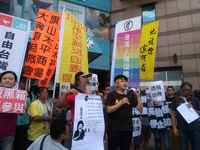Taiwan, Kaohsiung Protests as forced evictions loom
Taiwan Alliance of Anti-Forced Eviction representative Tien Chi-feng expressed hopes of seeing President Tsai and Chen immediately suspend eviction and removal of affected houses in Qishan's Dagouding, a local fruit and vegetable marketplace, and Ljavek village.
Civic groups demanded the suspension of three major Kaohsiung development projects at a protest Wednesday, citing a lack of transparency and disregard for the rights of those being evicted.
The deadlines for residents to vacate their homes fall before the end of this month for all three projects. The government has said it would evict residents by force if they choose to remain in their homes past those dates.
The demonstration, led by the Taiwan Alliance of Anti-Forced Eviction, was held outside the Democratic Progressive Party's (DPP) Kaohsiung headquarters, with activists seeking intervention by President and DPP Chairwoman Tsai Ing-wen and Mayor Chen Chu, a member of the party's Central Standing Committee.
The protesters claimed the municipal government did not reach out to affected residents to discuss details of the projects or organize forums to consider alternative proposals that might allow them to avoid the demolition of homes.
Should affected residents fail to leave before the deadline set by the Kaohsiung government, forced evictions will be carried out, slated to commence later this month.
Taiwan Alliance of Anti-Forced Eviction representative Tien Chi-feng expressed hopes of seeing President Tsai and Chen immediately suspend eviction and removal of affected houses in Qishan's Dagouding, a local fruit and vegetable marketplace, and Ljavek village.
"Sincere negotiations must be carried out with locals to ensure a transparent and public plan," Tien said. Tien demanded that the government provide land development plans for the three projects and carry out public hearing meetings to kick off talks for proposals that do not include eviction.
Kaohsiung said the three projects were carried out with the public interest in mind and were intended to improve greater urban security. "The problems," which have existed for decades, "will not be solved even in the next 50 years if no action is carried out at present."

